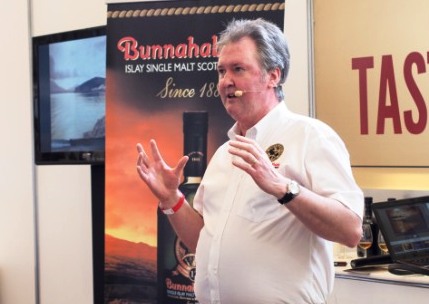By James Atkinson
The continued automation of Scotch whisky distillation will lead to a blandness in whisky, warns Burn Stewart Distillers master blender Ian MacMillan, who says the distilleries he controls are among a minority that still practice truly manual production.
MacMillan, who was in Australia recently, told bartenders at a trade tasting that he is a pure traditionalist in his belief that Scotch whisky must retain the craftsmanship of its origins.
“One of the saddest things for me today is when I travel through some of the big name distilleries in Scotland, the first thing you notice is no people,” he said.
“They are almost moving to total automation, which for me is very sad – it destroys the myth of what Scotch whisky is today.” [continues below]
Ian MacMillan at Top Shelf
In spite of their automated processes, MacMillan said big distilleries still espouse plenty of rhetoric about their proud long histories and “retaining their traditional values”.
“You’ll never see them writing on their boxes or their labels, ‘this was made in a distillery full of robots or computer planners’,” he said. [continues below]
The Burn Stewart portfolio of single malt whiskies (photo by whisky-ledger.com)
MacMillan, who oversees production of the Bunnahabhain, Tobermory, Ledaig and Deanston single malts – distributed in Australia by island2island Beverage Company – said that strict laws in Scotland dictate that there are only three ingredients permissible in Scotch whisky – malted barley, water and yeast.
“I believe there’s a fourth ingredient, and that’s the people that make it,” he said.
“They have such passion about what they do, and you tell me of any computer panel that has that sort of passion for making liquid.”
“I believe that automated production in distilleries will lead to a blandness in whisky. Without that human element you don’t have that unique style,” MacMillan said.

